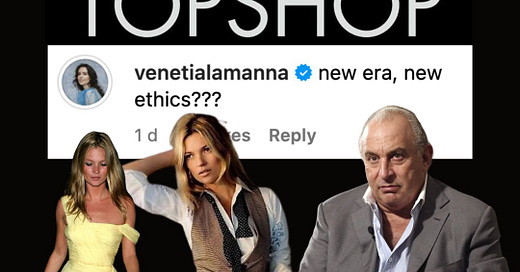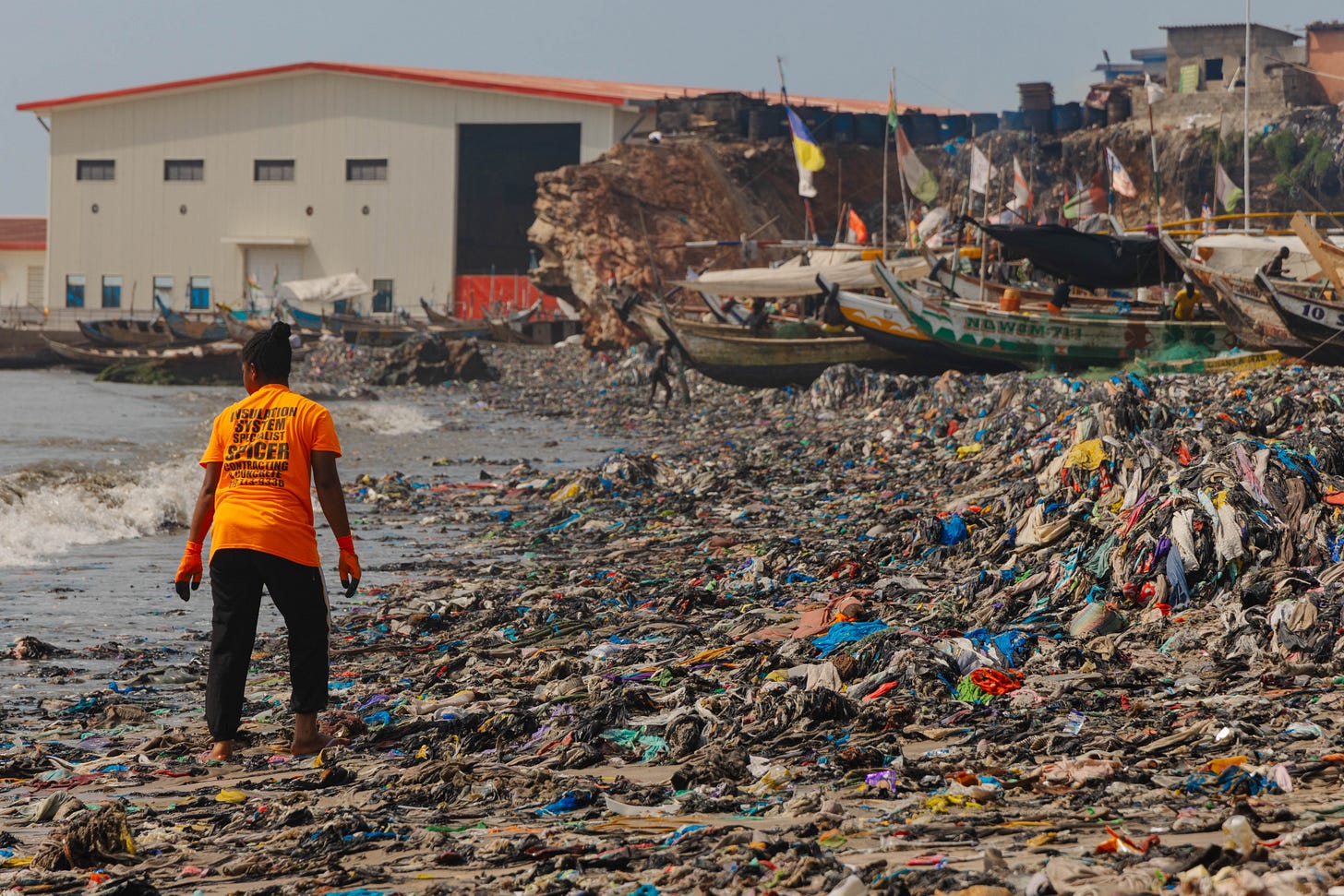It’s easy to feel overwhelmed by the state of Big Fashion—the never-ending workers’ rights abuses, overproduction, and greenwashing. But one thing that has genuinely improved over the past half-decade is the general public’s understanding of fast fashion and its negative impact on both workers and the environment. Big Fashion has cottoned on to this.
The very brands that once relied on their more accessible price points as a great democratiser are now trying to shed their “disposable” reputations in favour of so-called “staple pieces.” Unfortunately, they’re doing so without making any real changes to their purchasing practices, fabric composition, or overproduction. After all, they have Shein and Temu to compete with…
Manchester-born Pretty Little Thing (PLT) is trying to shake off its flashy reputation by, erm, following the ‘quiet luxury’ trend. Earlier this month, PLT’s founder Umar Kamani announced a “new era” for the brand in a Diary Of A CEO style interview with Steven Bartlett, soundtracked by emotive organ music. (I can’t link the video here, partly because Umar blocked me many years ago, but mostly because you will never get those 90 seconds back).
One day, I’ll tell you about the time I went for tea with Umar—gird your loins!
PLT’s so-called ‘legacy in progress’ rebrand is predictably beige, with items bearing a striking resemblance to former Creative Director Molly-Mae’s Maebe brand. Almost all of Pretty Little Thing’s newest products – even the most expensive items, such as a “wool look” trenchcoat and floral textured mini dress – are made from polyester and other fossil fuel derived synthetic materials. I also noticed a site-wide 30% discount, which hardly signifies a “new era” for a brand that has always offered mass sales (with some garments priced as little as 5 pennies in the past) and allowed customers to split payments over three instalments.
If you have ever watched a PLT haul video, you are likely to have felt overwhelmed by the scale of clothing that the company produces. In 2020, Vice reported that Boohoo produces over 100 garments per day and there have been no signals that this is likely to change. UK based, garment worker advocacy group Labour Behind the Label told me PLT has added “absolutely no data on volumes and any planned reduction–or expansion."
Despite our well-intentioned closet clearouts, charity shop drop-offs and trips to so-called recycling centres, most of the UK’s used clothing ends up being exported to the Global South, harming local communities and precious ecosystems in the process.
Kantamanto market in Ghana is the largest secondhand market in the world. It’s where much of the UK’s textile waste ends up – an estimated 15 million used garments enter the market each week. The local Kantamanto community consists of 30,000 independent upcyclers and resellers who are highly skilled and resourceful. However, when Big Fashion produces up to 150 billion items annually, there’s only so much they can do – and 40% still leaves the market as waste, polluting waterways and beaches.
The Or Foundation is an environmental justice charity based in Ghana, working with the Kantamanto community. The organisation conducts monthly beach audits to collect data about the clothing tags washing up on local beaches. Boohoo plc tags (which include Pretty Little Thing, Karen Millen and Coast) are the ninth most frequently discovered tags found polluting Accra’s beaches.
As it fights to stay profitable and relevant, PLT is stuck between a rock and a hard place. Since its inception in 2012, its quick turnaround, trend-driven business model has suffered extraordinary reputational damage, both in terms of its social and environmental impact. In July 2020, its parent company Boohoo faced allegations of slave labour in its Leicester garment factories, and an independent review led by Alison Levitt KC confirmed widespread labour abuses in the following months. As the company’s stock plummeted, Asos and Zalando removed Boohoo products from their sites. Boohoo cut many many suppliers, and launched the Garment and Textiles Workers Trust, but did not compensate all workers who had been grossly underpaid.
Now, Boohoo is also rebranding to Debenhams Group. The conglomerate is facing significant financial challenges—recording a 16% drop in sales last year. The official statement from the group claims Debenhams’ lean operating model is "the driving force of the business and will lead the group’s recovery." Unofficially, they mean: “We are desperately trying to keep up with Shein and Temu while simultaneously pretending we’re not fast fashion. Wish us luck.”
To top it off, Topshop has been teasing its comeback. Listen, I get that we’re all yearning for simpler times—I’m no exception. I currently have the Kate Moss for Topshop yellow dress in my Vinted saves, and I even wore my Topshop scoop-neck bodycon dress to my Christmas party, getting ready to the soundtrack of I Gotta Feeling by the Black Eyed Peas.
But unless Topshop plans to return with revised ethics, size inclusivity, and—oh, I don’t know—a mission to restructure its abuser-founded business model, can’t some things just be left in the past?
It is extremely unlikely that any of these brands will rebrand fashion out of its colonial pathways and exploitative supply chains. But there are plenty of workers, organisers, unions, and communities striving to rework fashion for the better—from garment makers in Bangladesh to the Kantamanto upcycling community in Ghana. It’s just that fair fashion’s rebrand isn’t about marketing; it’s about justice.
Here’s what a rebrand for a fast fashion brand should actually look like:
Paying their garment makers fair, living wages
Closing the pay gap between the highest-paid CEO and the lowest-paid garment maker
Giving their garment makers equity in the brand
Investing in local manufacturing, factories, craft and materials
Disclosing their annual production numbers by signing the #SpeakVolumes campaign to create industry-wide accountability
Paying for the entire life cycle of their garments by financially supporting the communities in the Global South who are left to collect, carry, and cope with Big Fashion’s oversupply
Boycott Reebok
In other news, Reebok has become the latest fast sportswear brand to sponsor the Israel Football Association, which has teams on illegally occupied Palestinian land. The Palestinian-led Boycott, Divestment and Sanctions movement successfully campaigned for IFA’s former sponsors Adidas and Puma to end their sponsorships, and it’s now calling for Reebok to do the same.
Please share this video (which has been shadowbanned) and if you’ve already successfully boycotted Reebok, use this to decide what you can boycott next!
Thank you so much for reading this article. If you would like to support my work, then please do consider becoming a paid subscriber.
In love and rage,
Venetia






